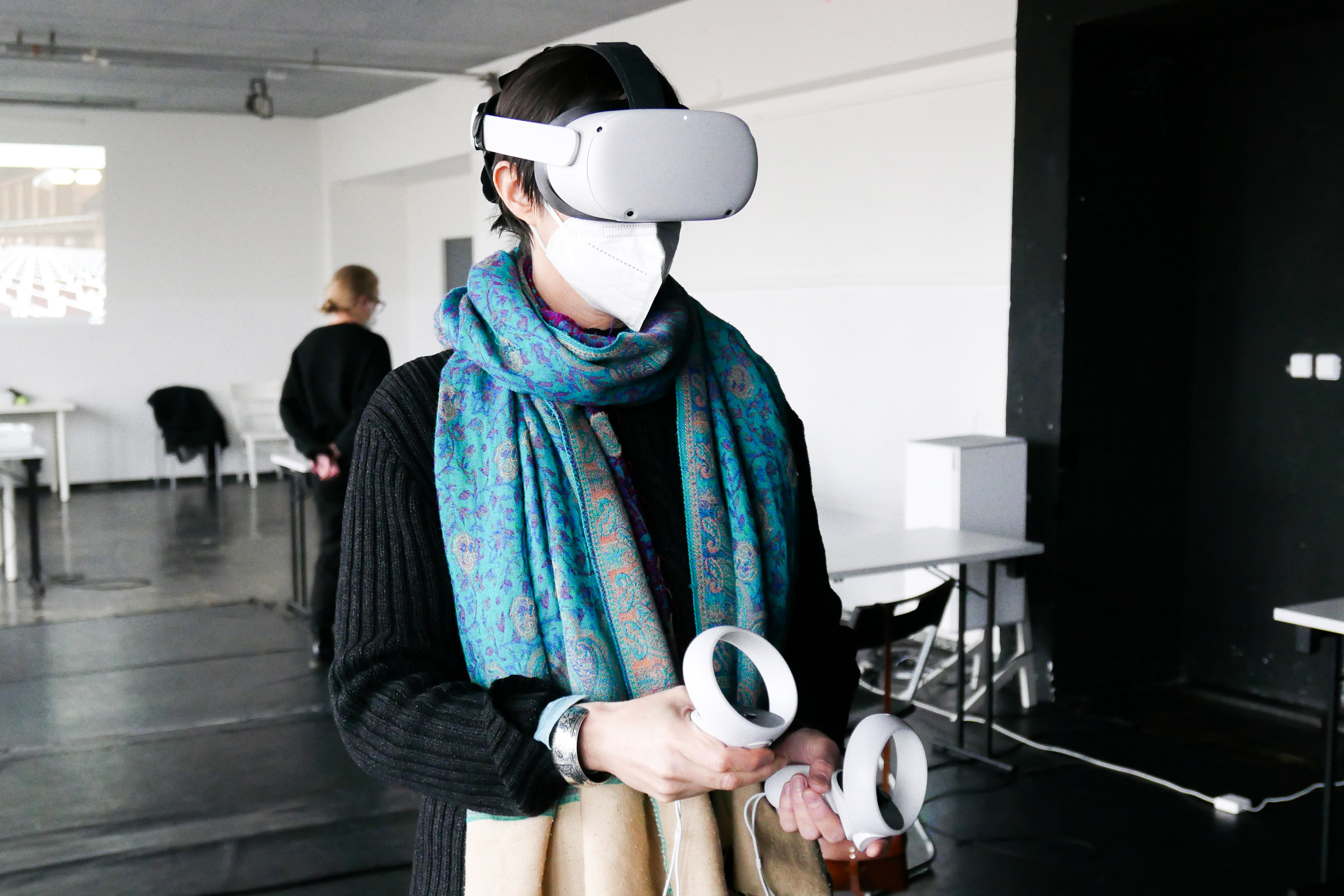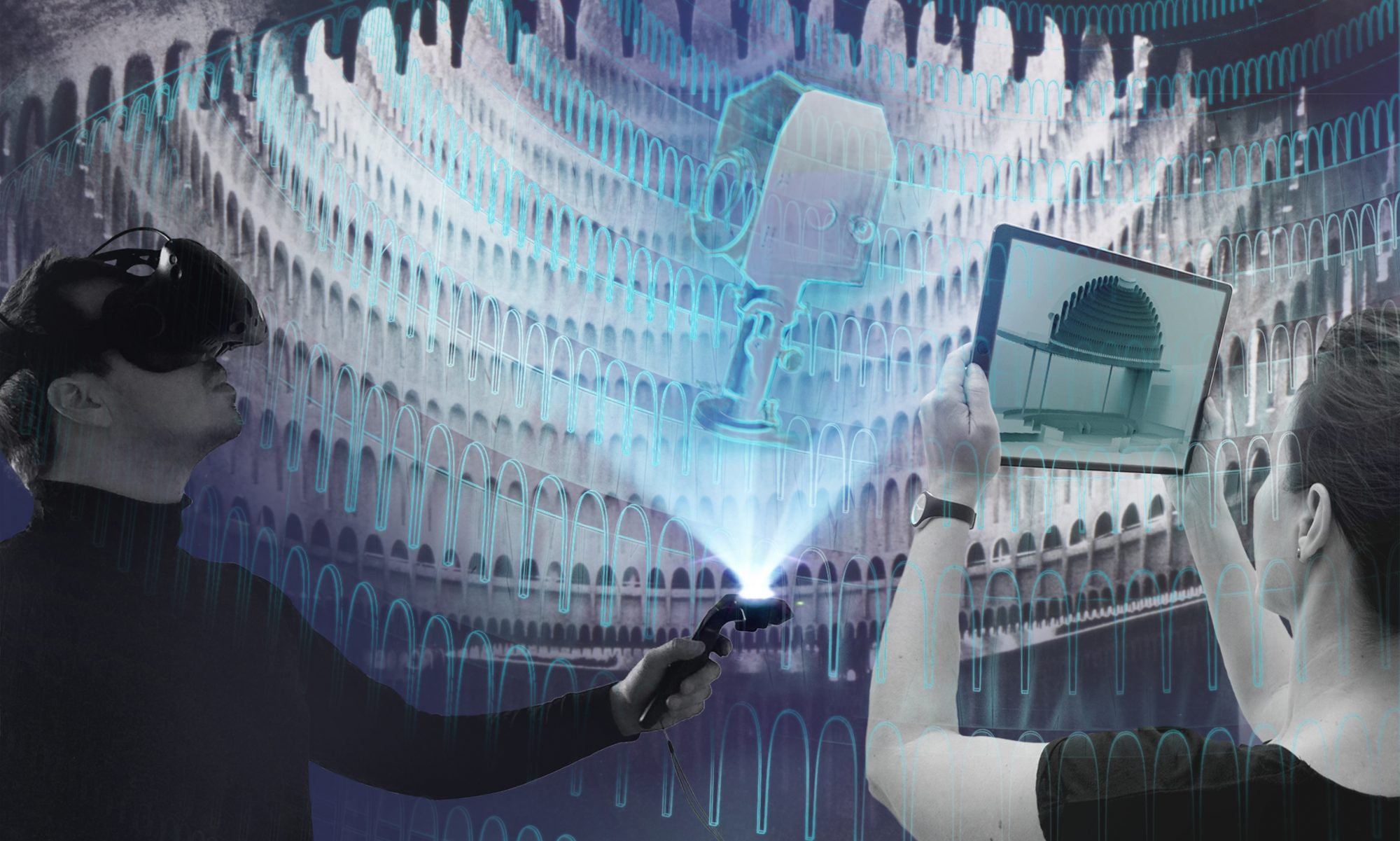In cooperation with the association “Bund der Szenografen”, a series of VR workshops will take place at various locations in Germany. The successful kick-off at the beginning of 2021 at the Theaterhaus Berlin-Mitte demonstrated the scene’s keen interest in exploring virtual design tools.

As part of the research project “Im/material Theatre Spaces,” the DTHG team is investigating the potential of digital technologies, specifically augmented (AR) and virtual reality (VR), for various areas of theater and exploring new possibilities at the interface of analog and digital worlds in the form of these workshops. Franziska Ritter, who is leading the two-year project together with Pablo Dornhege, states: “The technologies are fascinating and can achieve a lot, but often the inhibition threshold for theater professionals is still high. This applies to a lack of technical infrastructure and tight production budgets. With these practical workshops, we want to awaken fascination for the potential of digital tools and offer a chance to get in touch with virtual reality in an uncomplicated way.” Such a jump-start already took place successfully last year with the technical departments at the tjg Dresden and at Rheinisches Landestheater Neuss.
Progressive digitalization is also changing the everyday work of scenographers. As a result of this impulse, the “Digitaler Raum” working group was set up at “Bund der Szenografen” in June 2020 – here, interested members deal with digitality and scenography in regular working meetings. Oliver Proske, member of the board of the “Bund der Szenografen”, and Juliane Grebin, coordinator of the working group, explain: “In this way, we are creating a forum for exchanging experiences and discussing how techniques and skills can be used. We consider how we as scenographers can influence aesthetic developments in intermedial spaces and question possibilities and prerequisites – creatively, but also critically. Therefore, we welcome the collegial initiative of the DTHG and are pleased to be able to organize the workshop series for our members and thus open up a common space for discussion.”

What new possibilities does this technology hold for scenography, especially in times when travel and personal encounters are not feasible? To what extent can work processes be facilitated and analog stage design work be supported by these tools? What are the prerequisites for such a way of working in virtual space?
In the two-day practical workshop “How to go virtual?!” Vincent Kaufmann, theater technician and VR coach, will give a detailed insight into how VR can be used as a design, planning and communication medium in the individual creative practice. The small group of participants of only four people allows for individual attention, which is helpful in the initial contact with the technologies. A short theoretical introduction about terms and hardware/software functionalities leads to the practical focus of the workshop. On the one hand, it is about the practical testing of existing hardware such as Oculus Quest, HP Reverb G2 and various applications such as VR Sketch, Tilt Brush, Gravity Sketch and Mozilla Hubs (see also blog post “Quickly Recommended”). On the other hand, concrete usage scenarios will be tested together on the individual stage design.
With the programs presented, many scenarios of a digital workflow can be implemented: from the first own sketch of the stage design in virtual space, the preliminary discussion with the creative team in the 3D online model, to the live planning session in the form of a “virtual construction rehearsal”… When, how and which tools are used depends on the individual workflow and the secret lies in the skilful combination and flexible way of working. Working with virtual spaces is therefore a field that is currently being conquered by scenographers with improvisational and communication skills. Especially in times of pandemic restrictions, some digital meeting have already proven to be of great advantage and are guaranteed to become part of the post-pandemic workday. Vincent Kaufmann is enthusiastic about the openness of the participants: “Those who now manage to open up the opportunities of a hybrid way of working and welcome digitality not in the mode of “either-or” but integratively and curiously as “why not” are clearly at an advantage.

Workshop participant and video artist Isabel Robson notes, “Even though getting started with VR programs is very intuitive at first, after the first wow effect, it quickly becomes clear that these tools take a lot of time to acquire.” Working with digital tools requires patience, and designing in virtual space, like sketching and drawing, is also a craft and requires new skills – practice, as always, makes perfect. There is also often a lack of helpful prior knowledge and skills in the computer-aided visualization of designs – an area that is becoming increasingly important now and in the future and is often neglected in studies and training.
This basic understanding of digital design tools is necessary in order to elicit a personal “digital” signature from the often sleek programs and to achieve an aesthetic of one’s own. Designers often succumb to the temptation of trying to create the most “realistic” simulations of reality with a great deal of effort – even though the openness of thought of a quick sketchy representation or an abstracted working model is more purposeful at this early stage of the design process and leaves more room for the viewer’s imagination.
In the subsequent discussion with the participants and the working group “Digitaler Raum”, it quickly became clear that the necessary technical infrastructure (VR glasses, powerful notebooks, Internet, sometimes expensive software) for such a method of working is still too rarely available in theaters and in the studios of stage designers. Here, not only the creatives themselves, but above all the theaters and associations are called upon to realize innovative scenarios that can be implemented at short notice. This requires laboratories and digital workshops as co-working spaces, flexible technical infrastructures such as VR loan sets, and a joint transfer of knowledge. The workshop series, lecture series, working group meetings, common shared forums such as Discord or Slack are the first important steps for good networking here. In a first joint meeting, the DTHG team and the working group “Digitaler Raum” explored the Great Hall of the virtual Konzerthaus Berlin in the Mozilla Hubs online platform:

Conclusion: In order to meet the new challenges in the lockdown and to start into a new era, it is advantageous to deal with digital workflows. Thus, participation in the workshop is a meaningful further training opportunity – not only during the lockdown.
Stage designer Heike Vollmer sums it up well: “For me, technology is interesting as a means of communication within the artistic team and between theater technology (construction department and technical management) and the artistic team, because it is possible to try out ideas and designs in the digital space that take a lot more time, effort and energy in analog. Some new questions arose for me in the stimulating discussion: To what extent does the specific 3D aesthetic affect my design? What does the absence of anything physical or sensual during the design process mean for the implementation in 1:1? How can the analog and the digital complement and enrich each other in the design?”
These questions and more will be topics in future rounds of workshops! New workshops are being planned for creative teams, theater professionals as well as theater institutions / technical departments throughout Germany. If you are interested, you can contact:
Workshop management digital.DTHG:
Vincent Kaufmann – vincent.kaufmann@dthg.de
Bund der Szenografen working group “Digitaler Raum”:
Juliane Grebin – digital@szenografen-bund.de
Last but not least: The digital.DTHG team set up a responsible hygiene concept for the “How to go virtual” workshop series – with on-site quick tests, 2-meter distance and disinfection, and the reduction of aerosol exposure in the room with the help of a mobile Aspra air purifier. In this way, training courses can be carried out safely even during these times.
Authors: Franziska Ritter and Vincent Kaufmann
Photo credit: Juliane Grebin and Franziska Ritter


